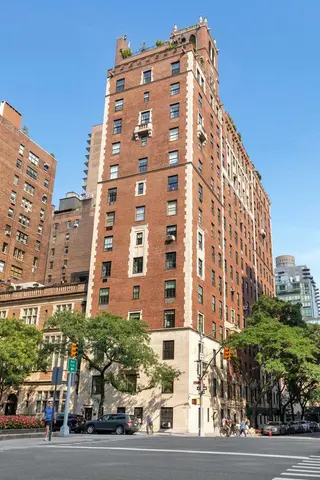 Carter Horsley
Carter HorsleyDec 23, 2011
Carter's Review
One of the city’s most distinctive and elegant residential buildings, this very handsome apartment building at 1021 Park Avenue on the northeast corner at 85th Street was erected in 1929 as a cooperative.
The 15-story building has only 27 apartments and was designed by Rosario Candela and Kenneth M. Murchison and erected by John and Joseph Campagna, the son of Anthony Campagna, one of the city s most important developers of luxury residential buildings. Candela was the leading architect of luxury apartment buildings of his era.
Bottom Line
Assaying this pre-war building is like watching a blackjack dealer handing out the first “up” cards, lots of potential and lots of mystery accompanied by the concatenating snap of his fingers delivering the “goods.” Life is going by, fast, so pay attention! It’s all about grandeur, real, not illusion.
Description
The red-brick building with a three-story limestone base, gargoyles and a handsome enclosed rooftop watertank enclosure, is notable because its design makes it appear at first glance to be more than one building and because it is also very compatible with the very handsome former townhouse of Reginald DeKoven, a composer of light opera, that was designed in Jacobean Renaissance style by John Russell Pope, immediately to the north and is also directly across the side-street from another very interesting mansion.
The side-street façade has a large center section outlined in stone that extends its masonry down to the first story and has arched window surrounds at the second story.
This apartment building has considerable "light-and-air" because of both the mansions and the Park Avenue Christian Church diagonally across the avenue.
The building has limestone quoins and the 6th and 7th floor center windows on the avenue façade have a two-story surround that mirrors the “in-and-out” design of the quoins and which is repeated in a one-story window surrounds higher up on the same façade at the 9th, 11th and 12th floors.
The same façade has attractive balconies on its center windows at the 3rd and 12h floors.
The building has prominent gargoyles above the 14th floor and at the top of its very handsome watertank enclosure which has arches and finials.
The setback near the top of the building is castellated.
A service entry at the east end of the building on the side-street has a inset light sconce.
Amenities
The building has a doorman and storage.
Apartments
Apartment 9C is a three-bedroom unit that has a 30-foot-long entrance gallery that leads to a 26-foot-long living room with a fireplace, a 17-foot-long library, and a 20-foot-wide dining room next to a 29-foot-long kitchen and breakfast room and an 11-foot-long laundry. The apartment also has a 9-foot-long study and a 16-foot-long den.
Apartment 4/5B is a three-bedroom duplex with a 12-foot-wide entry foyer leading to a 22-foot-log living room with a fireplace that connects to a 17-foot-long dining room next to a 21-foot-long pantry and a 16-foot-long kitchen with an island and a 7-foot-square dining area on the lower level and the bedrooms above.
History
In his excellent book, "Park Avenue, Street of Dreams," (Atheneum, 1990), James Trager provides the following account of the site's history:
"Quite a few Park Avenue houses went up in the years before World War I. A private residence designed by Hunt & Hunt for Amos R. E. Pinchot was finished in 1910 at the northeast corner of 85th Street. Pinchot, a lawyer, was the brother of Gifford, the conservationist who superintended the 119,000 acres of forest that surrounded Biltmore House, designed by Richard Morris Hunt for William Henry Vanderbilt's youngest son, George Washington, and completed in 1896. Gifford headed the U.S. Forest Service but was fired by President Taft after joining others in charging the Secretary of the Interior, Richard A. Ballinger, with conflict of interest - a cause celebre in 1910.
“The Pinchot house was later occupied under lease by Mrs. Alfred Gwynne Vanderbilt, Vincent Astor, and Joseph C. Baldwin before being purchased by Edward R. Stettinus, a J. P. Morgan partner, who occupied it until his death in the late 1920's."
Trager also noted that Amos Pinchot had sold Lewis Gouverneur Morris the lot on the southeast corner at this intersection, directly across from the side-street entrance of 1021 Park Avenue. Morris had the building on it razed and replaced with a building designed by Ernest Flagg that he moved into from his former residence at 77 Madison Avenue. The new, gable, dark red-brick house had hip-roofed dormer windows, a cupola over its elevator tower, and a garage in its east wing. Trager wrote that the daughters of Morris sold the townhouse in 1967 to the New World Foundation, "established in 1954 to carry out the testamentary wishes of the reaper heiress, Anita McCormick Blaine."
In his August 18, 2002 “Streetscapes” column in The New York Times, Christopher Gray noted that “although he was listed in the Social Register and was a member of Skull and Bones, the Yale secret society, as well as the Racquet and University Clubs in New York, Pinchot often held controversial views.”
“He deserted the Republican Party in 1912 to help found the Progressive Party, supporting Theodore Roosevelt’s independent, unsuccessful run for the Presidency. In the 1940s, he was an outspoken member of the American First Committee, opposing American involvement in the war in Europe….Pinchot…was like other wealthy men in wanting to maintain an environment suitable to his new house, and he bought up nearby land to prevent construction of stables, tenements and apartment buildings. In 1909 he resold the southwest corner of 85th and Park with a 20-year restriction requiring its use as a church. The South Reformed Church went up at the corner. In 1910, he resold three brownstones just to the north of his corner house to the composer Reginald DeKoven, but with a restriction on building anything but a private house until 1940 – and the house was not to be built any nearer than three feet from his north windows. DeKoven, whose works included a light opera called ‘Robin Hood,’ then built the Elizabethan-style 1025 Park Avenue, which still survives. In 1913, Pinchot resold the southeast corner of 85th Street and Park to Lewis Gouverneur Morris – a Wall Street broker and direct descendent of Gouverneur Morris, a principal drafter and signer of the Constitution in 1787 – restricting the land through 1934 to private-house use, although with the proviso that the restriction would be void if Pinchot’s house was used for business or apartments. Morris then built the slim brick building at 1014 Park Avenue,” Mr. Gray continued.
A November 30, 1969 article in The New York Times by Linda Charlton noted that “an application by Barbara Streisand to buy a $240,000 Park Avenue cooperative apartment [in the building] has been turned down by the cooperative’s board of directors, reportedly because of objections to having ‘flamboyant Hollywood types’ in the building.”
Location
This building adjoined the garden of Mrs. Reginald de Koven, widow of the composer, and also backed up on the garden of the Park Avenue Methodist Church on 86th Street.
The building is not far from to the Metropolitan Museum of Art on Fifth Avenue and there are numerous schools and religious institutions nearby.
Cross-town buses run on 86th Street and an express subway station is at Lexington Avenue and 86th Street as well as major stores such as Barnes & Noble and HMV.
The area also has several movie theaters.

- Co-op built in 1929
- 1 apartment currently for sale ($3.85M)
- Located in Carnegie Hill
- 27 total apartments 27 total apartments
- 10 recent sales ($1.5M to $11.5M)
- Doorman
- Pets Allowed
 6sqft delivers the latest on real estate, architecture, and design, straight from New York City.
6sqft delivers the latest on real estate, architecture, and design, straight from New York City.
